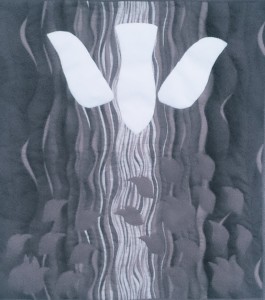A sermon based on 1 Kings 19:3-8
I watched a movie this weekend called Machine Gun Preacher. It’s based on the life of Sam Childers, played by Gerard Butler, a former drug-dealing biker tough guy who finds God and and a calling.
His calling is to save orphaned children from being conscripted into the Sudanese army. Childers builds an orphanage in Northern Uganda, close to the border of Sudan. Just after he finishes building the orphanage, raiders come across the border to capture the children he has housed. Childers and his guards fight them off (yes, with machine guns), but the raiders burn all the buildings.
Childers, sad and disappointed, calls his wife. He suggests to her that he has failed and that he should just come home. He nearly sings a song my mother taught me, “Nobody loves me, everybody hates me, I’m gonna eat some worms.” But Childers’ wife says, “God called you to do this work. Get off your butt, stop your crying, and build it again.”
And that brings us to Elijah. I have always wondered what the big deal about Elijah is… Malachi prophecies that Elijah will return before the day of the Lord comes. When Jesus asks the disciples who the crowds say that he is, the disciples answer, Some say that you are the prophet Elijah.” When Jesus is standing on a mountain, at the Transfiguration, he is pictured with Moses and Elijah. Later, one of the disciples asks, “Why do the scribes say that Elijah must come first?” Jesus explains that Elijah had come, and that they did to him whatever they pleased. But what is the significance of this prophet who we hear about in the first and second book of Kings?
As I have studied this morning’s text and the passages about Elijah’s life, I began to see something. I began to see Elijah as a prophet during what Thomas Cahill calls “a hinge time.” This is a time when everything changes, and Elijah stands in the middle, connecting the past to the future, bringing about a new and different covenant with God.
We don’t know anything about the call of Elijah to prophethood, but we do know about the time when he was called.
Ahab was king and Jezebel was queen of Israel, the Northern Kingdom. The text specifically says that Ahab was the worst king. “He did more to provoke the anger of the Lora than had all the kings of Israel before him.” He worshiped Baal. He killed prophets. He formed illicit partnerships with other nations. Ahab was a bad dude. So God brought drought to the land. Which, of course, brings a famine.
Remember the other famines? Famine drove Abram and Sarai into Egypt. Famine int he land caused Naomi, Ruth and Orpah to flee Israel. Then there was famine that drove the Hebrews into Egypt where Joseph was in favor with the king. That’s how the Hebrews became enslaved to the Egyptians and to Pharaoh in the first place. Famines were bad.
But this one didn’t send the people of Israel out of the land. It did, however, send Elijah to the widow of Zarephath’s home, where God filled up her pot of oil and her stash of four each day. She was able to feed her family and Elijah each day.
So God sends Elijah to see this wicked king. Elijah challenges Baal, the god of Ahab, to a duel. Two altars are built. Two sacrifices made. And the one swallowed up in fire wins. The prophets of Baal dance around their sacrifice, calling on their god. They wait and they wait for Baal’s sacrifice to catch fire. Elijah taunts the prophets of Baal with questions, like “Is your god sleeping? Is your god out traveling?” The altar of Baal does not catch fire. (Editor’s note: this would make an amazing Monty Python movie.)
Just to make the fight fair, though, Elijah saturates God’s altar with water. Gallons and gallons he pours over it. He calls out to God, only once, and the sacrifice is swallowed in fire.
Of course, this makes Ahab and Jezebel very angry. But what makes them even angrier is that Elijah’s fire has convinced the people that God is God, and they round up the prophets of Baal and kill them all. The drought ends, rain falls on the land of Israel.
I am sure that Elijah thought that this would make him a hero. I think he thought the nation would turn on a dime, repent, and begin worshiping God again. But it doesn’t happen that way. Instead, Jezebel is seeking to take Elijah’s life.
So he bolts. He runs for the hills. He sits himself under a broom tree and begs to die. Then he sleeps. And sleeps. And sleeps.
It’s easy to see what’s going on here. Elijah is suffering from a loss of his dreams. He is suffering from a loss of hope. He is suffering from depression. An angel comes, taps him on the shoulder, wakes him up, and feeds him. The angel says, “Get up and eat. Otherwise the journey will be too much for you.” It’s provisions from heaven, like the manna from the sky.
Elijah gets up, walks forty days and forty nights to Mount Horeb… Hmmm. 40 days and 40 nights—reminds me of Noah, when the rains came 40 days and 40 nights. And 40? Wasn’t that how long the Hebrew people wandered in the desert? 40 years? And that number 40? Wasn’t Jesus in the desert for 40 days and 40 nights as his preparation for ministry?
And let’s not forget that Mt. Horeb (which is another name for Mt. Sinai) is where God has done some pretty amazing stuff. God called Moses out of the burning bush there. God gave the 10 commandments there. God also showed Moses the promised land from Sinai. It’s a place of covenant and promise. A place of hope. Being on Mt. Horeb is like proclaiming, “I am going to do a new thing here!”
Then God asks Elijah a question: “What are you doing here, Elijah?” Elijah answers, “I have been very zealous for the Lord, the God of hosts, for the people of Israel have forsaken your covenant, thrown down your altars, and killed your prophets with the sword. I alone am left, and they are seeking my life, to take it away.” Poor, poor pitiful Elijah. It’s like that song “Nobody loves loves me, every body hates me, I’m gonna eat some worms.” Elijah holes himself up in a cave and doesn’t come out until…
The fireworks begin. The wind rushes through. BUT GOD IS NOT IN THE WIND. A might earthquake rumbles. AND GOD IS NOT IN THE EARTHQUAKE. Then fire burns everything in its path. AND GOD IS NOT IN THE FIRE.
Sheer silence follows.
A small murmuring. A still small voice, some translations call it. When Elijah felt the silence, he knew. It’s a new thing. And he slipped his cloak back on, this cloak that is the symbol of his prophethood, takes one look back at his old calling, the old dreams, and says to the Lord, “I have been very zealous for the Lord, the God of hosts, for the people of Israel have forsaken your covenant, thrown down your altars, and killed your prophets with the sword. I alone am left and they are seeking my life, to take it away.” The emphasis moves from “poor, pitiful me,” to ““God called me to do this work. I’m gonna get off my butt, stop my crying, and build it again.”
Then God says, “Go.” Elijah goes. He follows in the footsteps of Abram in Genesis 12:1-3 when God tells he and Sarai that they will start a new nation. He follows in the footsteps of Moses in Exodus 3 at Mt. Horeb, watching the burning bush when God says, “Go to Egypt and get my people out of slavery.” He makes way for the prophecy of Jeremiah 31:33, “I will put my law in their minds and write it on their hearts. I will be their God and they will be my people.” And Elijah forms a path for the Advent of Jesus into the world.
Elijah stands at a hinge in the history of salvation. Bridging the covenant of God with Abram, with Moses and the Hebrew people, bridging the new covenant of God through Jesus, bridging between the Tower of Babel, when the shared language was destroyed, to Pentecost, when languages become one again.
In today’s passage, Elijah stands at a hinge in his own personal journey. His call changes after meeting God in the sheer silence. While he continues to look at the past, he is called into a future that is different. No longer a force to be reckoned with, he becomes a bridge to the future—anointing the new kings of Israel and Judah, and anointing the next prophet, Elisha.
And Elijah’s greatest fear, and his greatest wish, under that broom tree never happens. Even though he prays for death, he never meets it. Instead, he travels to Bethel, where Abram build the first altar to the Lord, he walks past Jericho, where Joshua led the people to take the Promised Land, and he parts the Jordan River, like Moses parting the Red Sea. Elijah never dies. He is taken up to God on a chariot.
Each of us stands, at some point in our lives, in this hinge where the silence of God takes us to a new place, a new calling. We may be standing in this hinge today. The Church universal is standing in this hinge. The question is, will we listen to the still, small voice? Will we accept the mantle? Will we get off our butts, stop our crying, and rebuild?
The good news is that we’re not alone. We serve a God who believes in our value and our worth and loves us like crazy, loves us enough to take on that mantle, the cloak of humanity, through Jesus, to join us on our journey.
Madeleine L’Engle wrote, “We have to be braver than we think we can be, because God is constantly calling us to be more than we are.” And in this hinge, this silence, where we await God’s new thing, God’s love provides for us, tapping us on the shoulder, saying to each of us, “Get up and eat, otherwise the journey will be too much for you.”











